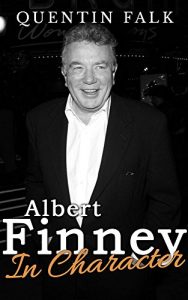In the 1960s, Albert Finney was the screen’s incarnation of the new British working-class hero. In the theatre, he was hailed as the ‘new Olivier’. Yet, instead of actively pursuing either image, he went his own way and became a millionaire.
To some, he became the leading actor of his generation. To others, he had an ambition bypass. To severer critics, Finney has remained cheerfully indolent, almost wilfully failing to fulfil the remarkable early promise which led to comparisons not only with Olivier, but also Scofield, Burton, Cagney and even Spencer Tracy.
On screen, he appeared in more than twenty films, including classics such as ‘Saturday Night and Sunday Morning’, ‘Tom Jones’, ‘Two for the Road’, ‘Murder on the Orient Express’, ‘Annie’, ‘The Dresser’, ‘Under the Volcano’, ‘Miller's Crossing’ and ‘The Playboys’.
On stage, where he was chosen to lead the first South Bank National Theatre Company in the mid-1970s, he has played Macbeth, Hamlet, Tamburlaine the Great, Henry the Fifth, Billy Liar and Luther.
On television, he’s run the gamut from Pope John Paul II to Kingsley Amis’s ‘The Green Man’. Over his remarkable career, Finney, the son of a Salford bookmaker, has earned four Oscar Best Actor nominations and won a host of awards worldwide.
He has been married (and divorced) twice, indulged in very public affairs, owned a fortune in horseflesh and travelled to most corners of the world. He also has a son, Simon, from his first marriage to Jane Wenham.
His humour and drive was an inspiration for his fellow actors – especially when times were hard and morale was at an all time low. Recollections from his former colleagues are fondly described.
Yet the man, who from his record would appear to be a pillar of the establishment, seems deliberately to have remained an outsider.
In ‘Albert Finney In Character’, Quentin Falk attempts to probe the real man beneath the many masks of actor, director, traveller, bon viveur and lover. Falk has spoken on and off the record to many of Finney’s friends, colleagues and critics, including Martin Sheen, Angela Lansbury, Lindsay Anderson, Karel Reisz, Gregory Hines, Carol Burnett, Susannah York, Alan Parker, Robert Hardy, Peter Nichols, Sidney Lumet, Bernard Hepton, Anthony Hopkins and many many more.
Quentin Falk, author of books on Graham Greene, Lew Grade, the Rank Organization and Anthony Hopkins, is a former editor of ‘Screen International’, and he also contributes regularly to the ‘Daily Telegraph’, the ‘Mail on Sunday’ and the ‘Sunday Mirror’.
Endeavour Press is the UK's leading independent publisher of digital books.
To some, he became the leading actor of his generation. To others, he had an ambition bypass. To severer critics, Finney has remained cheerfully indolent, almost wilfully failing to fulfil the remarkable early promise which led to comparisons not only with Olivier, but also Scofield, Burton, Cagney and even Spencer Tracy.
On screen, he appeared in more than twenty films, including classics such as ‘Saturday Night and Sunday Morning’, ‘Tom Jones’, ‘Two for the Road’, ‘Murder on the Orient Express’, ‘Annie’, ‘The Dresser’, ‘Under the Volcano’, ‘Miller's Crossing’ and ‘The Playboys’.
On stage, where he was chosen to lead the first South Bank National Theatre Company in the mid-1970s, he has played Macbeth, Hamlet, Tamburlaine the Great, Henry the Fifth, Billy Liar and Luther.
On television, he’s run the gamut from Pope John Paul II to Kingsley Amis’s ‘The Green Man’. Over his remarkable career, Finney, the son of a Salford bookmaker, has earned four Oscar Best Actor nominations and won a host of awards worldwide.
He has been married (and divorced) twice, indulged in very public affairs, owned a fortune in horseflesh and travelled to most corners of the world. He also has a son, Simon, from his first marriage to Jane Wenham.
His humour and drive was an inspiration for his fellow actors – especially when times were hard and morale was at an all time low. Recollections from his former colleagues are fondly described.
Yet the man, who from his record would appear to be a pillar of the establishment, seems deliberately to have remained an outsider.
In ‘Albert Finney In Character’, Quentin Falk attempts to probe the real man beneath the many masks of actor, director, traveller, bon viveur and lover. Falk has spoken on and off the record to many of Finney’s friends, colleagues and critics, including Martin Sheen, Angela Lansbury, Lindsay Anderson, Karel Reisz, Gregory Hines, Carol Burnett, Susannah York, Alan Parker, Robert Hardy, Peter Nichols, Sidney Lumet, Bernard Hepton, Anthony Hopkins and many many more.
Quentin Falk, author of books on Graham Greene, Lew Grade, the Rank Organization and Anthony Hopkins, is a former editor of ‘Screen International’, and he also contributes regularly to the ‘Daily Telegraph’, the ‘Mail on Sunday’ and the ‘Sunday Mirror’.
Endeavour Press is the UK's leading independent publisher of digital books.






